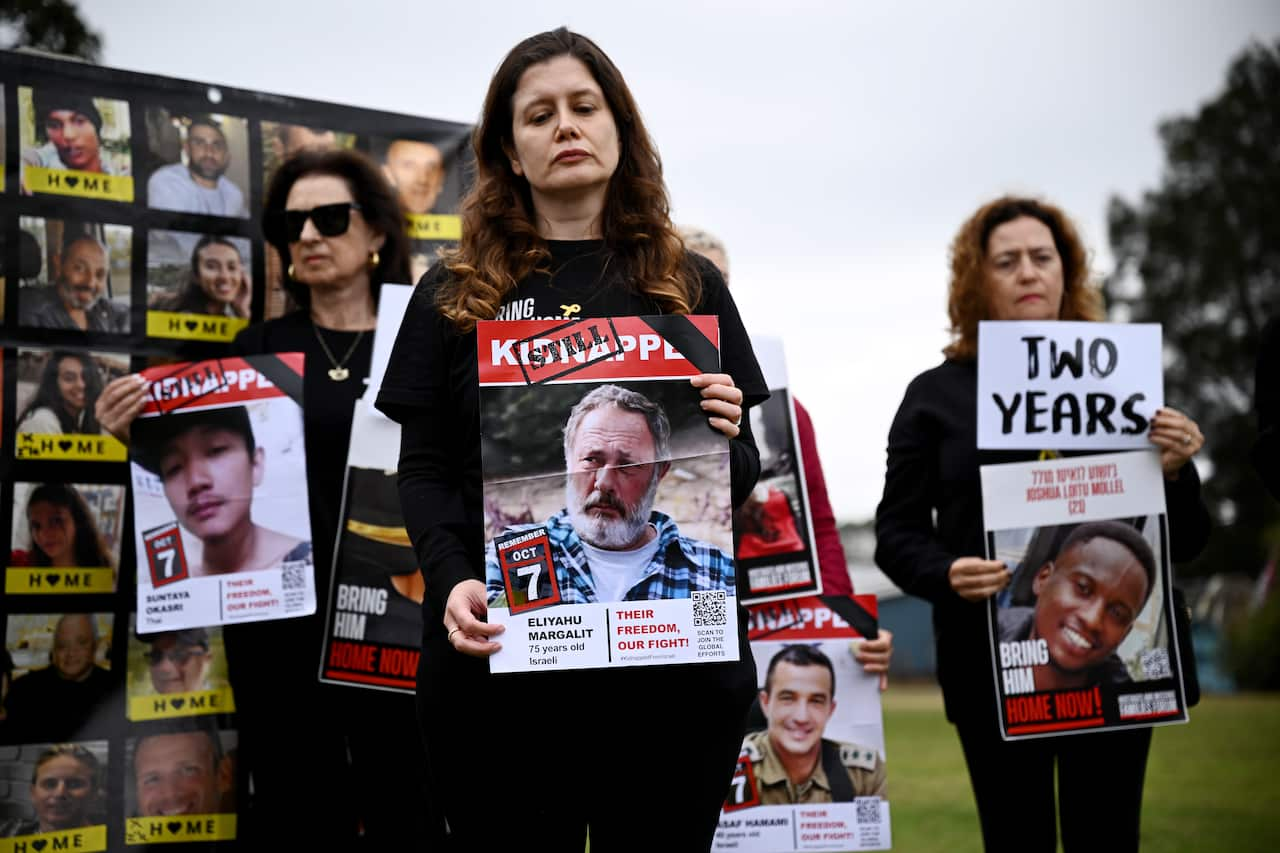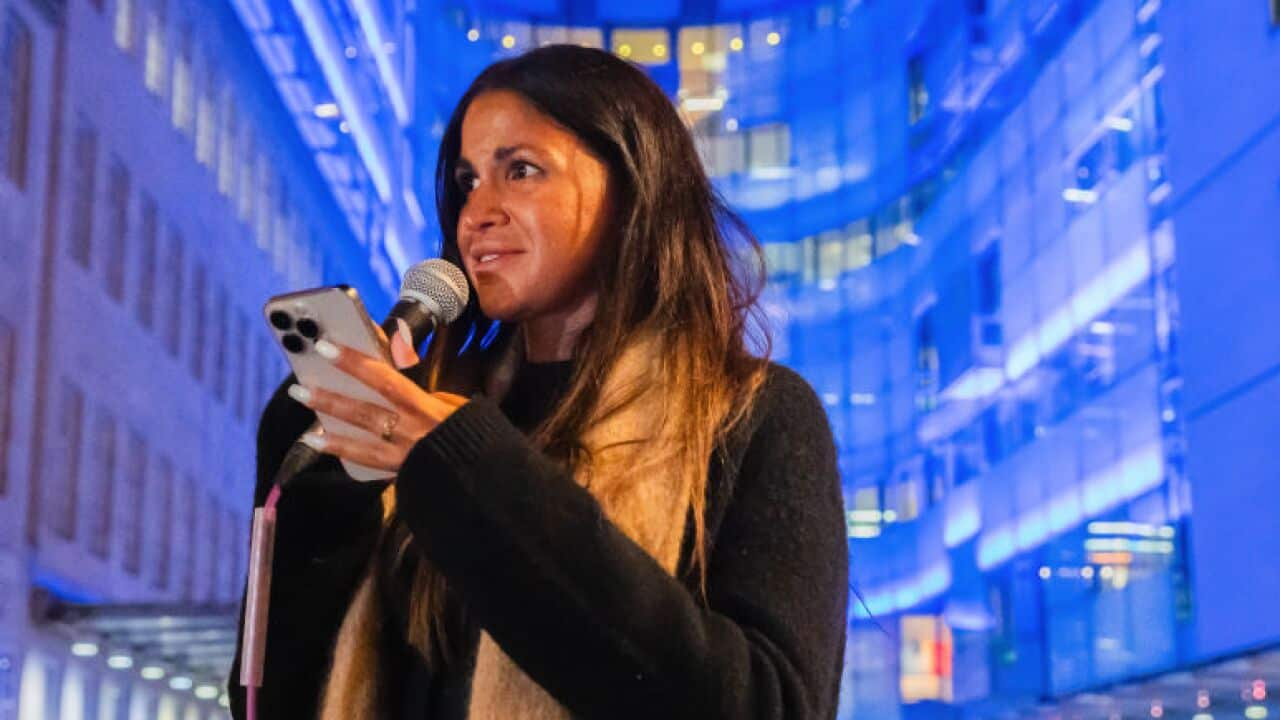Nova festival survivor Natalie Sanandaji says that, on the morning of 7 October 2023, she woke up "to the sound of rockets being intercepted overhead".
However, not yet knowing that over 360 people would be killed and dozens taken hostage at the festival, most attendees remained calm.
"I try to explain to people, imagine a festival happening anywhere else in the world, and imagine festivalgoers dancing and then seeing rockets being intercepted right over their heads," she told SBS Hebrew in a recent interview.
"Imagine them reacting in such a calm manner. That simply wouldn't happen. But unfortunately for Israelis, this is their reality."
Those who never left the Nova festival were among the 1,200 people killed when Hamas-led militants stormed southern Israel on this date two years ago.
The militants also seized 251 hostages, 47 of whom are still in Gaza. Of those, the Israeli military says 25 are dead.
Since then, more than 66,000 people have been killed in Gaza, the majority of whom are civilians, according to Palestinian authorities.
Sanandaji spoke about the shock of what she saw that day, her instinct to protect her mother from distress, and the split-second decisions that saved her life.
"People had been partying all night. As the sun rose, they would have seen paragliders coming in from the direction of Gaza. Then they would have heard gunshots," she recalled.
Sanandaji said people at the festival "took a while to realise that there were terrorists inside of Israel".
"When we started evacuating to our cars, we still thought it was just rockets," she said.
"We started driving out and if you can imagine, there was a little over 3,000 people at this festival. Majority were leaving at the same time. Some left first, some that were more nervous.
"Unfortunately, a lot of those did not survive because they were the first ones to meet the terrorists face-to-face".
Sanandaji's mother called her, knowing she was at a festival, but she said she lied about how much danger she was in, not wanting to tell her the truth until she was home safe.
"I lied to her. I told her I was at a different festival. I told her that everything was okay and I told her I was actually on my way home," she said.
Speaking about why she wants to continue sharing her story about the life-changing, traumatic incident, Sanandaji said she believes telling her story is a gift.
"When it comes to my voice, specifically, not just as a Nova survivor, but also as a Persian Jew, as someone whose family fled persecution from the Islamic regime when it came into power, I think the purpose of my voice is to teach people history, to show people that history is repeating itself," she said.
"Because what I've realised from most of my activism is that [the] majority of the population has not been taught history."
'Remember lives stolen'
Meanwhile, Australian Jewish organisations are also commemorating the two-year anniversary of October 7, but the diversity of sentiment shows ongoing community division around Israel's response.
The Executive Council of Australian Jewry (ECAJ) said it "remember[s] the lives stolen, the hostages still held, and the pain felt in Israel and here in Australia".
"Amid hate, we choose unity, resilience, and hope," the peak body said in a short social media statement.
Alex Ryvchin, co-CEO of ECAJ, said that, over "these past two years, our community has experienced everything from the terrifying to the absurd".
"While we will never forget, nor forgive, what Hamas did on this day two years ago, and what it continues to do, we live in hope that the hostages will soon be free, the anguish of the families will soon end, and they can all begin to heal," he said at a press conference today.
Colin Rubenstein, executive director of the Australia/Israel & Jewish Affairs Council, said the past two years had weighed heavily on the Jewish community in Australia and around the world.
"Even if the hostages are released, the war ends, and the Hamas threat is decisively disarmed, the Jewish experience can never return to what it was like before October 7 2023," he said.
Meanwhile, other Jewish groups incorporated the commemoration of both Israelis and Palestinians into their observance of the date.
The New Israel Fund said: "The pain and shock of that day is seared into our memories — the brutal attacks, the unimaginable loss of life, the kidnappings, the terror, and the grief."

"Similarly, the deaths of so many innocents in Gaza and the destruction of their cultural, health and educational institutions has traumatised not only those living in Gaza, but the many family and friends who live in Israel, the occupied territories, neighbouring countries and around the world," the New Israel Fund said in a statement.
The Jewish Council of Australia acknowledged the date as both two years since the Hamas-led attacks and "two years since Israel began its genocide against Palestinians in Gaza".
"The continuation of this genocide has only placed the Israeli hostages' lives, and the lives of all people in Israel, at greater risk," they said in a statement.
Israel has said it "categorically rejects" allegations of genocide, which have now been made by a United Nations commission of inquiry and the vast majority of the 500-member International Association of Genocide Scholars.
The Australian National Imams Council made similar claims, saying it marks two years "of relentless genocide and war waged against the people of Gaza".
"Entire neighbourhoods lie in ruins, hospitals and schools have been deliberately destroyed, and a man-made famine by the Israeli occupation continues to starve children and innocent people to death," the council said in a statement.
Israelis' response to October 7
Like Australian Jewish organisations, the Israeli public also remains divided over the country's response to the October 7 attacks.
A recent poll by the Israel Democracy Institute revealed 66 per cent of Israelis say the time has come to end the war in Gaza, citing the danger to hostages as the main reason.
The Hostage and Missing Families Forum said it's been "an unimaginable two years since October 7, or one long day that never ended since that dark, hellish morning".
"With both hope and dread in the air surrounding the outcome of [US] President [Donald] Trump's peace plan, tens of thousands are rallying across the world in support of the families, and to Bring Them Home," the group said via their Bring Them Home Now social media account.
Delegations from Hamas and Israel have started indirect talks in Egypt around the proposal that would initially lead to the exchange of Israeli hostages for Palestinian prisoners and those held in administrative detention in Israel, as the first stage for a longer-term peace.
This story was produced in collaboration with SBS Hebrew.
— With additional reporting by the Australian Associated Press
For the latest from SBS News, download our app and subscribe to our newsletter.

